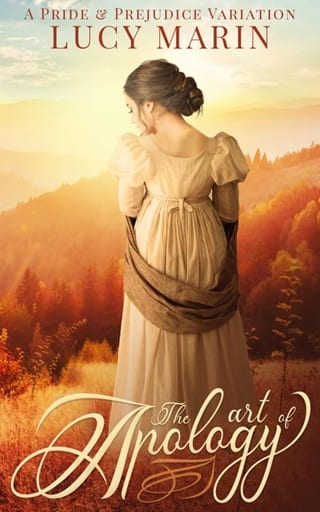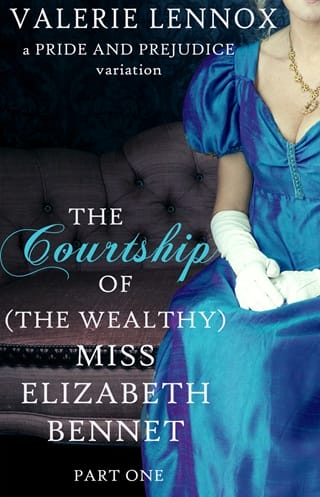Chapter 30
CHAPTER THIRTY
T he following Tuesday, Jane received a note from Miss Bingley, announcing that she and the Hursts had gone to London.
We are anxious to be amongst our friends after so long an absence. Despite what our brother said about soon returning to Netherfield, Louisa and I agree that, once reminded of the delights of being in town, he will not want to. We imagine that, even now, he is thinking of writing to urge us to join him.
I shall always be so grateful that we were able to learn something of Hertfordshire and that Charles can be satisfied that he has fulfilled our father’s wish. Your company and the warm welcome extended to us by your family and neighbours has been most appreciated.
With fond regards,
Miss Caroline Bingley
Jane had come into Elizabeth’s chamber to show the missive to her. They were sitting on the bed together, and having read it, Elizabeth folded the fine paper and tossed it onto the small painted table to her side. She looked at Jane, who was nervously nibbling her bottom lip, and rolled her eyes.
“You do not think she is correct, do you?” Jane asked. “That Mr Bingley might change his mind about coming back.”
Elizabeth took hold of her hands. “No, my dearest sister, I do not, and I do not believe you do either. Has Mr Bingley given you any indication that he could be so fickle?”
Jane shook her head. “It is just that…I do care for him, and my heart would break if he did not.”
Elizabeth linked their fingers together. “Mr Bingley adores you, as he should. Mr Darcy has also promised to return, and I have complete confidence in his word—just as you ought to in Mr Bingley’s. Unfortunately, his sisters are not as fond of the neighbourhood as he is. I also suspect they hope to separate him from you. I am sorry to say it because I know you think of them as friends. As kind as they were”— to you , she silently added—“I have reason to think they want him to purchase an estate in a county they find more acceptable and to make a brilliant match—one that will assist with their social ambitions. Fortunately, Mr Bingley is wise enough to know that he should choose his home and his wife to please himself, with his happiness in mind.” The source of her information was Mr Darcy, but she would not disclose it without his permission.
Jane lowered her eyes and frowned. “I thought the ladies liked me. ”
“I believe they do. Who would not?”
“Their disapproval will disappoint Mr Bingley. If he decides to propose to me.”
Elizabeth laughed. “You know he will. I know he will. Everyone who has seen you together knows he will. Mrs Hurst and Miss Bingley will resign themselves to his decision, and I shall think them despicable creatures if they do not grow to love you and admit that he was right to settle on you within two years of your marriage. We shall see your Mr Bingley very soon—by Thursday, or perhaps Friday—and then you must pity me. Mr Darcy will not return for another fortnight or longer.”
True to her prediction, Mr Bingley was once again ensconced at Netherfield Park by the end of the week. He was unconcerned about his family’s departure when Mrs Bennet mentioned it to him, saying only that, “I understand they received several invitations they did not feel they should refuse, including from Hurst’s family,” and that he was unsure when they would be in Hertfordshire next.
He spoke more freely to Elizabeth and Jane when the three of them walked into Meryton together several days later. The afternoon was as warm and fair as it was right to expect in early December, and Mary, Kitty, and Lydia formed a trio ahead of them. Their purpose in going was to search for small Christmas gifts for Mr and Mrs Bennet and the Gardiners.
“They talked a lot of nonsense,” Mr Bingley said, sounding exasperated. “It was nothing I had not heard before. I like Meryton, to say nothing of the people I have met here.” There was a pause during which Elizabeth pretended not to see the affectionate looks he and her sister exchanged. “I told them I was fixed at Netherfield for…well, I do not know how long. In part, it depends on the owners. They were not interested in selling the estate when Darcy and I enquired last summer, but I do not know whether they will hold to that or when they will wish to return. In any event, this is where I choose to be.”
“How could they ask you to stay in town when you and Mr Darcy had already agreed that he would bring his sister here for Christmas?” Jane said. “It would be going back on your word.”
“Which I would not do,” Mr Bingley said with a firm nod. “I would never want to disappoint Darcy, who has always been a good friend to me. I had the impression my sisters did not believe he was serious about spending Christmas here or thought that he would change his mind now he is in London.” He turned to Elizabeth. “I have forgotten to give you his message. He begged me to tell you that everything is arranged, and he will be in Hertfordshire on the twentieth, unless the weather delays their journey.”
“Their? It is certain that Miss Darcy will be coming with him?” Elizabeth asked.
Mr Bingley nodded. “I knew Darcy liked you, but his actually requesting that I pass on his assurances… You have made a conquest, Miss Elizabeth, and I can name a dozen young ladies who would be wildly envious if they knew.”
All three of them laughed. Mr Bingley mentioned that his friend had spoken to his aunt about invitations to her ball, assuring her and Jane that, “He has arranged all that, too, and either you will receive Lady Romsley’s card in the post or he will bring it with him.” To Jane, he added, “You will be able to accept?”
Jane smiled serenely and nodded. “My aunt wrote to say that they would be very happy to take us to town with them after Christmas and accompany us to the ball.”
Peeking around the gentleman to her sister, Elizabeth said, “I believe you and I have gowns to shop for. Do you think Mr Bingley would object if we spent a short while—no more than two hours—looking at fabric?”
Their laughter was hearty enough that Mary, Kitty, and Lydia demanded to know what was so amusing.
In her own words, Georgiana was delighted to hear that Darcy had met a special lady. That is what he had called Elizabeth when he informed his sister what had kept him away so long. His happiness was such that he had told her almost as soon as he had arrived at his town house. She had also sounded surprised, for reasons he did not understand, but her eagerness to meet Elizabeth had only grown the more he described her. She had readily agreed to spend Christmas in Hertfordshire, even when he had warned her of Wickham’s presence in the neighbourhood.
Furrowing her brow and sounding shocked at the notion that it would disturb her, she said, “What do I care about that ? When will you propose? Do you think she will like having me as a sister? Did you say she has four others already? What are they like? What are their names and ages?”
They were in her apartment, and once she had voiced her final question—not even waiting for him to respond—she rose from the sofa and went to her writing table, saying, “I must begin to make preparations for our departure.” She listed items she must remember to pack, notes to send to friends she had intended to see in the coming weeks, and purchases she wished to make.
“We shall not leave for some time,” he reminded her.
Her back was to him, and thus he could not see her expression, but she shook her head.
“There is so much to do,” she said. “You cannot imagine, Brother. If I am not confident I have seen to it all, I shall be nervous when I meet her. She might be my sister! I hope she will be. She sounds perfectly lovely. She must be since you are so much happier than you were when you went away. I do not want her to hate me because I am flustered when we first meet.”
Darcy wondered whether her rather exaggerated notions were a common occurrence amongst young ladies of her age. He did not know enough about them to make a comparison, but Elizabeth might have some valuable insight.
“Georgiana,” he said. She made a noise that indicated she had heard him. “It has lately come to my attention that I was in a particularly disagreeable mood last summer. I am sorry for it.”
He watched as her body stilled, and, after a pause, she slowly turned to face him. Her voice was small when she said, “You owe me no apology. It was my fault. ”
“No,” he said firmly, shaking his head in emphasis. He had wanted to acknowledge his poor behaviour, which must have affected her as it had Bingley, Elizabeth, and many others, and he was glad he had; it told him that she had blamed herself, and it was important that she realise he and he alone was responsible for his actions. Beyond that, it was Wickham who was the cause of his unhappiness, not her. He attempted to explain that he had been angry with the man he had once considered his dearest friend and disappointed in himself for failing to do his job of protecting her adequately. That led to a longer conversation about Ramsgate and his recent history with Wickham, and he told her a little of what had happened when he had first arrived in Meryton. Part way through, she returned to her former place near him.
“I am even gladder that you met Miss Elizabeth,” she said. “She has made you happier, and I shall love her for that alone. Is her father really an old friend of Uncle Darcy’s?” She was as astonished by the coincidence as he had been.
“He is, and they are both desirous of renewing their connexion. I shall call on him in a day or two, if you would like to come with me. Aunt Darcy and Cousin Rebecca will wish to see you.”
She said that she would, then asked whether she might return to her preparations. “I still want to hear more about the Bennet girls, but perhaps you can tell me at dinner. I shall talk to Mrs Annesley as soon as she returns from her errands. I am sure she will be agreeable to going with us to Meryton since she had not planned to see her family until the spring. Oh, I just remembered something I must add to my list!”
After attempting to speak to her of her activities since he had been away or anything other than Elizabeth and Hertfordshire and receiving no reply, he left her to her task.
 Fullepub
Fullepub 



